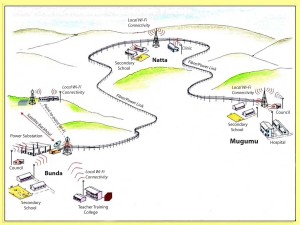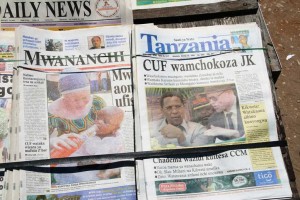The Comic Relief team of pop-stars, DJs and television presenters including Chris Moyles, Ronan Keating, Gary Barlow, Wearne Cotton, Denise Van Orton, and Cheryl Cole who recently climbed Mount Kilimanjaro, raised some £1.6 million for the charity, which supports many causes including some in Tanzania. But, according to the Independent (March 13th) they needed an army of helpers to get them to the top. There were some 33 climbers, two doctors, 100 porters, and two runners plus a detachment of security guards. Half a ton of broadcasting equipment, several open-air latrines and an awful lot of soup also had to be carted up the mountain. Weather conditions, which saw temperatures reach 30°C by day and minus 15°C by night, meant that as they neared the summit, each of the climbers was swathed in four pairs of trousers, six fleece tops and a balaclava. They had to cope with 75 miles per hour winds and extreme cold. Thank you Elsbeth Court for sending this – Editor.
The latest series of the very popular BBC TV programme ‘The Apprentice’ had a Tanzanian angle. Joseph Kilasara sent us this in mid-April when the contest was in full swing:
Mona Lewis, a former Tanzanian beauty queen is flying the Tanzanian flag sky-high in the award winning TV show now in its fifth run – “The Apprentice”. For three weeks running she has proven by a long mile to be a strong candidate for our next best Ambassador at large. One can only bet that her next date in Tanzania will be at Magogoni Street in Dar es Salaam for the country to say thank you for doing us proud.
Hailing from Arusha, Mona was born in Karachi, Pakistan and is now living in Sittingbourne, Kent. She was a runner up in the 1996 Miss Tanzania beauty Pageant. The ex-Natwest Customer Advisor is reportedly to be honest, self driven and with a positive attitude summed up in her own words; “Having the ability to drive a dead horse to the winning line”.
Sadly, in this show Tanzanians and friends in UK cannot vote to influence the one man as hard to play as Stradivarius – Sir Alan Sugar, but in Ms Lewis we have reason to be confident confident that she will stay long enough to hear the famous phrase: “You are hired”.






